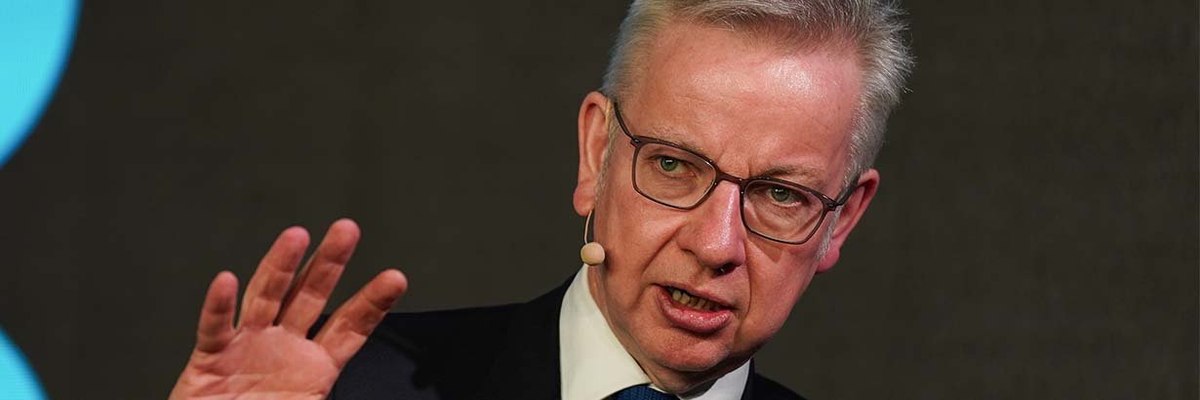It may be one of the most quoted lines from cinema history: ‘Do you feel lucky punk?’ You won’t need me to remind you that the lines were spoken by Clint Eastwood pointing his pistol at a gangster lying at his feet. If the gangster is lucky the pistol has no bullets left in its chamber after the preceding shoot-out so he can risk trying to escape. If he’s not lucky … he’s dead. The gangster plays safe and lives.
I recalled that scene when Michael Gove made his big speech in the House of Commons this week about the threat to the nation of Islamic extremism. His warning may have been rather less dramatic than that made by Hollywood’s toughest hardman, but some observers noted that he was delivering a clear warning to extremists: watch your step or else. Was this a timely reminder that the nation may be heading down a dangerous path or an overreaction to the behaviour of a small minority?
What Mr Gove announced was that there is to be a new government definition of extremism that is more precise than the existing definition. Here’s how he defined extremism: “The promotion or advancement of an ideology based on violence, hatred or intolerance that aims to negate or destroy the fundamental rights and freedoms of others.” He used parliamentary privilege to name five groups whom he accused of promoting that ideology. He had concerns about the "Islamist orientation" of three of them. The other two, he said, were far right groups promoting a "neo-Nazi ideology" : people who were guilty of undermining liberal parliamentary democracy.
Even though they have been named, the groups are not being criminalised as such. It will not be breaking the law to be associated with them. But if they do end up on the new blacklist they will be banned from having any contact with government ministers or officials or public bodies and they will not be allowed to receive any funds from the public purse. The intention of the measures is to prevent the groups from insinuating themselves into public life and influencing government policy and public opinion.
The groups themselves are predictably angry at being named. Two of them are already threatening to take legal action if they do indeed end up on the blacklist. As for the wider reaction to Mr Gove’s approach, opinion is divided between those who think he has gone too far and those who think he has not gone far enough.
Mr Gove promised there would be a “high bar” for inclusion on the blacklist. He said it would include only those who engaged in the most “concerning activities”. And the Times agrees that Mr Gove was right to deliver new guidance to extremist groups: “There is always the danger in a tolerant society like Britain’s that extremist groups will try to cosy up to officialdom by portraying themselves as representatives of community opinion or special interests. A central list of organisations that, for example, may be non-violent but act as apologists for Islamist terrorism should be easily available to Whitehall departments, arms-length public bodies, quangos and police forces.”
But it’s worried that the implications of the statement to Parliament might be the “thin end of the authoritarian wedge”. It's not alone in that. Critics, including former home secretaries, lawyers and clerics have warned that a list drawn up by civil servants — whom Mr Gove describes as a “centre of excellence” — is vulnerable to bias and mission creep, with bodies espousing strongly held views on a whole range of topics at risk of being swept up in an ever-widening net.
One Conservative MP, Miriam Cates, said she was worried that “gender critical” feminists who believe that biological sex cannot be changed would be trapped in the new definition and labelled as extremists because they do not believe people should be allowed to change their sex on their birth certificates. Andrea Williams, the chief executive of Christian Concern, said the new definition of extremism was not fit for purpose because Christians could be deemed extreme for believing in “real marriage” or being “pro-life”.’
Most concern came from those who saw Mr Gove’s measures as on assault on Muslims – not least because it comes on the back of anger at the mass pro-Palestinian demonstrations in London and Rishi Sunak’s speech on the steps of Number Ten on the threat of extremism.
What worried the Times was that the officials making these decisions on who should be included in the blacklist would be unelected and largely invisible: “ Inclusion of a group in a list of extremist organisations, even one intended only as a guide for public bodies, could carry with it drastic consequences in terms of funding and membership. Yet the proposals do not appear to include an avenue of appeal short of judicial review, an expensive exercise. This is a matter of concern and it should be addressed. These measures would be helped by government being required to publish detailed reasons for blacklisting particular groups.
“There is a constant risk of extremists— Islamist or otherwise — creeping under the radar into British public life in the guise of a charity or campaigning group. Of course, there should always be an advisory role for those with honest intentions seeking to enlighten government about the concerns of particular ethnic or faith communities.”
It concluded, though, that “there is nothing wrong in ensuring that they enjoy a clean bill of health. As sold, these measures are a reasonable exercise in due diligence.”
The Guardian reflected on Mr Gove’s promise that his new measures would help the fight against extremism and concluded: “It will not”. Instead it said if “community cohesion and tackling hatred truly been a priority, a full public consultation and proper engagement with faith groups would have been the right way forward. Instead came what the Conservative peer Sayeeda Warsi described as a divide and rule approach.
“Both the government’s current anti-terrorism legislation reviewer, Jonathan Hall, and a predecessor, David Anderson, have expressed concerns about the broad wording. Unlike the existing 2011 definition, it focuses on ideas rather than action would “destroy the fundamental rights and freedoms of others”.
The Archbishops of Canterbury and York have each warned that the new measures would disproportionately target Muslim communities and threaten freedom of speech, the right to worship and peaceful protest.
The Guardian is concerned that peaceful demonstrations and civil disobedience are being delegitimised under a prime minister who has claimed that democracy is succumbing to “mob rule” while their own politicians offer a veneer of respectability to divisive and anti-democratic sentiments. It points out that Suella Braverman, the former home secretary, described pro-Palestine demonstrations as “hate marches”.
It accepts that antisemitism and Islamophobia have both risen sharply since the October 7th attacks by Hamas and tackling the underlying causes and impacts of extremism is essential but “politicising the issue” is another matter. It also points out that three former Tory home secretaries – Priti Patel, Sajid Javid and Amber Rudd – were among those who warned last weekend that no party should use it for short-term tactical advantage and it concludes: “Turning this issue into a campaign tool can only fuel divisions, instead of healing them.”
Where do you stand on this? Do you believe that we need a new definition of extremism and a blacklist of those organisations that are deemed to breach the rules?
More fundamentally, perhaps, to what extent do you think our democracy is at risk from extremists and if it does worry you, where does the greatest threat come from? The far right? The far left? Islamic extremists?
When you see pro-Palestine marchers taking to the streets of London every weekend are you sympathetic or are you scared? And if you are a Moslem or a Jew, has your life been changed by everything that has happened since October 7th? And, if so, how?
Do let us know.











